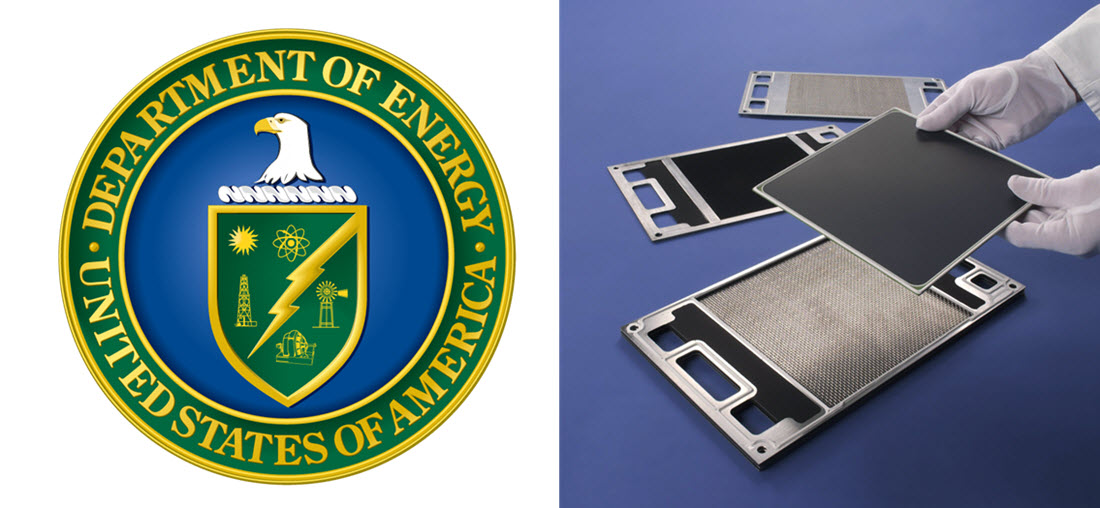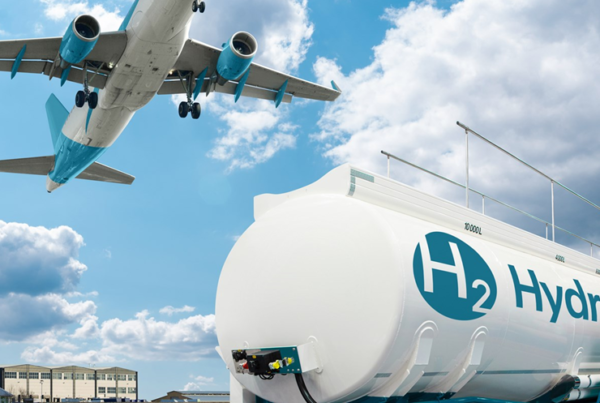
WASHINGTON, D.C. – Today, the U.S. Department of Energy (DOE) announced the selection of 12 projects to receive approximately $34 million in federal funding under the funding opportunity announcement (FOA), Small-Scale Solid Oxide Fuel Cell Systems and Hybrid Electrolyzer Technology Development.
This FOA seeks to develop advanced technologies that can progress the present state of small-scale solid oxide fuel cells (SOFC) hybrid systems using solid oxide electrolyzer cell technologies to a point of commercial readiness for hydrogen production and power generation. It also seeks validation of SOFC using syngas from gasification facilities.
“The Trump Administration is committed to making SOFC systems commercially available for hydrogen production and power generation. Selecting these projects for funding is a huge step toward that goal,” said Secretary of Energy Dan Brouillette. “By working with National Laboratories, academic institutions, and private industry, we are combining a vast amount of knowledge and expertise to mature—and ultimately commercialize—these technologies.”
This research effort is part of DOE’s Office of Fossil Energy’s (FE) SOFC Program, which focuses on enabling the generation of highly efficient, cost-effective electricity from coal and natural gas with near-zero atmospheric emissions. The selected projects work toward the shared goal of ensuring an efficient and reliable electrical grid, while also protecting the environment.
“SOFCs are electrochemical devices that convert the chemical energy of a fuel and oxidant directly into electrical energy. They are unique in that they produce electricity through an electrochemical reaction and not through a combustion process,” said Assistant Secretary for Fossil Energy Steven Winberg. “This means that SOFCs are much more efficient and environmentally benign than conventional electric power generation processes.”
The applicants identified for selection received the highest technical scores in their area of interest under the DOE FOA issued in May of this year.
The twelve selected projects under DE-FOA-0002300, Small-Scale Solid Oxide Fuel Cell Systems and Hybrid Electrolyzer Technology Development, fall under three area of interest (AOIs).
AOI 1: Small-scale distributed power generation SOFC systems
(1) Modular Fuel Cells Providing Resiliency to Data Centers and Other Critical Power Users – Aris Energy Solutions, LLC (Mount Vernon, NY) and its partners, the National Energy Technology Laboratory, the University of West Virginia, Gaia Energy Research Institute, the National Aeronautics and Space Administration/West Virginia facility data center, and Velocity Data Centers, will advance the standard of modular SOFC systems and present a defined pathway toward DOE’s long-term goals of achieving price compression of SOFC systems through research, development, and demonstration. The project will emphasize progression from development toward deployment.
DOE Funding: $2,659,212; Non-DOE Funding: $204,315; Total Value: $2,863,527
(2) Improving Cost and Efficiency of the Scalable SOFC Power System – Cummins Inc. (Columbus, IN) and its partner, the University of Connecticut, will advance the research for small-scale SOFC power systems by designing and developing a 20kW small-scale SOFC power system for applications such as data centers and commercial buildings. The goal is to demonstrate pathways to sub-$1000/kW goals. The key components of the Cummins balance-of-plant-system include a cathode blower, an anode off-gas recirculation blower, a reformer, and heat exchangers.
DOE Funding: $2,601,046; Non-DOE Funding: $650,261; Total Value: $3,251,307
(3) Small-Scale Solid Oxide Fuel Cell Systems and Hybrid Electrolyzer Technology Development – Redox Power Systems, LLC (Beltsville, MD) and its partners, the Pacific Northwest National Laboratory and AVL Drivetrain Engineering, will use advanced lower temperature/higher power SOFC and high-performance balance-of-plant components to enable the wide-scale adoption of 5-25kW systems for distributed generation (DG) applications. The goals are to make significant progress toward the commercialization of SOFCs for DG applications through the development of a ≥7kW system prototype demonstrator and to reduce the system’s cost to a level on par with alternate technologies at lower production volumes.
DOE Funding: $2,660,653; Non-DOE Funding: $675,495; Total Value: $3,336,148
AOI 2: Hybrid systems using solid oxide systems for hydrogen and electricity production
(4) Low Cost, Large Area SOEC Stack for H2 & Chemicals – Pacific Northwest National Laboratory (Richland, WA) and its partner, the University of California–San Diego, will fabricate and demonstrate operation of an efficient 2-5kW solid oxide electrolyzer cell (SOEC) that is able to utilize steam to produce hydrogen, or to utilize steam and carbon dioxide to produce synthesis gas in electrolysis mode. For successful implementation, commercially viable systems must factor in cost, reliability, and lifetime. The objectives of this three-year project are to lower the cost of SOEC stack production and to improve stack performance and durability, which will help accelerate commercialization and market adoption.
DOE Funding: $3,000,000; Non-DOE Funding: $-; Total Value: $3,000,000
(5) Efficient, Reliable and Cost-Effective Reversible Solid Oxide Cell Technology for Hydrogen and Electricity Production – The University of California, U.C. San Diego (La Jolla, CA) and its partner, OxEon Energy, will develop and demonstrate an efficient, reliable, and cost-effective reversible solid oxide cell (RSOC) technology for production of hydrogen from steam and electricity from natural gas. This novel RSOC technology is based on a compact and low-cost stack architecture that incorporates high-performance and fuel-flexible reversible cells for efficient operation in both fuel cell (power generation) and electrolysis (hydrogen production) modes.
DOE Funding: $2,999,125; Non-DOE Funding: $88,044; Total Value: $3,087,169
(6) Performance Improvements for Reversible Solid Oxide Fuel Cell Systems – FuelCell Energy, Inc. (Danbury, CT) and its partner, the Center for Power Electronics Systems at Virginia Polytechnic Institute and State University (Virginia Tech), will work to advance high efficiency and low cost reversible solid oxide fuel cell (RSOFC) system technology for the hybrid operation of water electrolysis for hydrogen production, as well as for power generation using hydrogen. Research in three areas will be pursued concurrently: (1) improvements to the fundamental repeat unit materials in the RSOFC stack (cell, seal, interconnects, and coatings) to improve efficiency and reduce degradation; (2) stack design improvements, particularly in the area of thermal management, which offer the potential for improved degradation characteristics and/or increased power density; and (3) advanced fuel cell power management technology.
DOE Funding: $3,000,000; Non-DOE Funding: $675,000; Total Value: $3,675,000
(7) Reversible Solid Oxide Fuel Cell System – NexTech Materials, Ltd. dba Nexceris, LLC (Lewis Center, OH) and its partners, Northwestern University and the Colorado School of Mines, will scale reversible solid oxide (RSOC) stack technology to the prototype system level and demonstrate world-class performance to achieve hydrogen production costs of less than $2/kg at a large-scale system level (100 kW or larger). Nexceris’ cell and stack technology will be utilized in this project. Northwestern University will contribute fundamental knowledge of RSOC fuel electrode materials and conduct long-term pressurized testing on button cells before the impacts of pressurization are assessed in RSOC stacks. The Colorado School of Mines will contribute its RSOC system design, pressurized stack testing capabilities, and system techno-economic analysis based on the demonstration system tests in the project.
DOE Funding: $3,000,000; Non-DOE Funding: $750,000; Total Value: $3,750,000
(8) Cummins R-SOFC System Development – Cummins Inc. (Columbus, IN) will potentially advance the standard for reversible solid oxide fuel cell (R-SOFC) systems by developing two novel technologies to enable $2/kg-hydrogen production with a 30 percent overall product cost reduction. Based on the Cummins proprietary thermally sprayed metal supported stack, the research is intended to further lower cost and improve performance by modeling and developing an advanced sheet-metal substrate. This project will advance the technology readiness of R-SOFC systems and has the potential to enable the earlier commercial viability of small-scale hybrid electrolyzer plants.
DOE Funding: $2,000,824; Non-DOE Funding: $500,206; Total Value: $2,501,030
(9) A Highly Efficient and Affordable Hybrid System for Hydrogen and Electricity Production – Phillips 66 (Bartlesville, OK) and its partner, the Georgia Institute of Technology, will demonstrate the commercial feasibility of a low-cost, highly efficient reversible solid oxide cells (H-rSOC) system based on proton conductors for hydrogen and electricity generation. The unique advantages of this system over those based on an oxygen-ion conductor include: (1) producing pure/dry hydrogen without the need for downstream separation/purification; (2) dramatically enhancing the durability of the fuel electrode, since the risk of Ni oxidation by steam is eliminated; and (3) making the conductivities of the proton-conducting membranes much higher than those of zirconia-based electrolytes. That implies much smaller ohmic loss and higher efficiency.
DOE Funding: $3,000,000; Non-DOE Funding: $450,000; Total Value: $3,450,000
(10) Reversible SOFC-SOEC Stacks Based on Stable Rare-Earth Nickelate Oxygen Electrodes – Saint-Gobain Ceramics and Plastics (Northboro, MA) and its partners, Boston University, West Virginia University, Worcester Polytechnic University, and the Gaia Energy Research Institute, will advance and validate the performance and durability of materials used in the active layers of reversible solid oxide cells and stacks. The proposed project will leverage the results of a successful HydroGEN seedling project which is focused solely on the oxygen electrode of an SOEC and has demonstrated a 70 percent increase in current density at 1.2V over the baseline.
DOE Funding: $2,390,992; Non-DOE Funding: $597,748; Total Value: $2,988,740
(11) Performance Validation of a Thermally Integrated 50 kW High Temperature Electrolyzer System – Battelle Energy Alliance, LLC (Idaho Falls, ID) and its partner, OxEon Energy, Inc., will reconfigure a 50kW BOP solid oxide electrolysis system that is currently being fabricated at Idaho National Laboratory to operate at approximately 30kW in electrolysis mode and 10kW in fuel cell mode. The system will use advanced SOC stacks provided by OxEon. OxEon will incorporate a new catalyst in the hydrogen electrode that will be infiltrated in post-cell fabrication. The catalyst composition and processing conditions will be investigated at the Massachusetts Institute of Technology, which is a subcontractor to OxEon Energy.
DOE Funding: $2,999,610; Non-DOE Funding: $393,819; Total Value: $3,393,429
AOI 3: Cleaning process for coal-derived syngas to be used as SOFC fuel and testing of single and multiple cells on syngas
(12) Solid Oxide Fuel Cell Technology Development – University of North Dakota (Grand Forks, ND) and its partner, the National Energy Technology Laboratory, with technical support from Worcester Polytechnic Institute, Carnegie Mellon University, and the Ohio Fuel Cell Coalition, will utilize: 1) EERC existing state-of-the-art capabilities, including gasifiers, a configurable array of syngas cleanup technologies, solid oxide fuel cell test stands, and on/off-line analytical systems and 2) NETL expertise in identifying, modeling (via the JOULE 2.0 supercomputing facility), and quantifying SOFC component degradation modes. The major outcome in this project will potentially be a syngas cleanup train demonstrated to yield a coal syngas capable of sustaining SOFC performance equal to that of natural gas at (projected) commercially viable capital and operating costs.
DOE Funding: $3,999,944; Non-DOE Funding: $-; Total Value: $3,999,944
Read the most up to date Fuel Cell and Hydrogen Industry news at FuelCellsWorks




